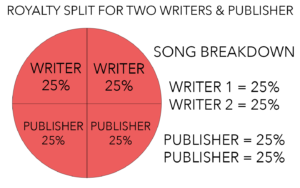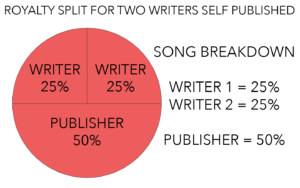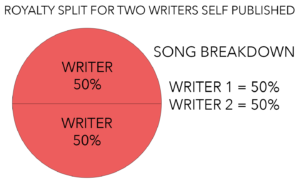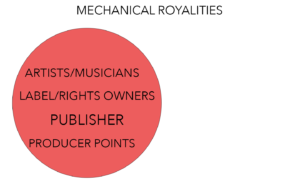As an artist, label owner and recording engineer one of the most common questions I get asked by clients is how does music publishing work. Also, how does this work into those ever important songwriter splits.
Firstly, lets start by clearly explaining what many artists fail to realise. If you’re a songwriter, a composer, a lyricist, or anyone else who creates original music, and you’ve not signed a deal with a music publishing company then — YOU own your music publishing rights!
Most artists rush into getting involved with a ‘music publisher’ because they feel that they need one as quick as possible. But many artists fail to realise that YOUR copyrights are the most important thing you can have as an artist.
Giving them away to the first person that comes along is very foolish and taking money off the table that otherwise should be yours. When giving away publishing rights you are giving away money to someone else every time your music is streamed, downloaded, performed, played on radio manufactured on physical product and synced to film/TV or media. So you must always weigh up what exactly a publisher is going to do for you in return for giving away one of your most valuable copyrights.
Before we get into how royalties are split, lets start with the important question….
What is Music Publishing and What do Publishers Do ?
A music publisher or publishing company is responsible administering and exploiting Intellectual property/copyright. They ensure that songwriters and composers receive payment when their compositions are used commercially.
Through an agreement called a publishing contract, a songwriter or composer “assigns” the copyright of their composition to a publishing company. In return, the company administers compositions, licenses compositions, helps monitor where compositions are used, collects royalties and distributes them to the composers. They also secure commissions for music and promote existing compositions to recording artists, film and television.
The copyrights owned and administered by publishing companies are one of the most important forms of intellectual property in the music industry. The other is the copyright on a master recording which is typically owned by a record company.
Key Roles of a Publisher include:
- Registering the works of songwriters and composers with all appropriate collecting societies and agencies, eg PRS for Music in the UK.
- Producing and licensing the production of printed music
- Promoting composers and songwriters and their music to performers, broadcasters, record companies and others who use music on a commercial basis, both nationally and internationally
- Licensing the use of music, whether directly in the case of individual and special usages (eg synchronisation deals) or via the collecting society network
- Monitoring and tracking the use of the music they represent and ensuring that proper payment is made for all licensed uses
- Making royalty payments to songwriters and composers in respect of the usage of their music
aking appropriate action against anyone using music without the necessary licence
Whilst all of these things seem to be ideal. Perhaps, even taking some of the stress away from the artist. For example, the artist doesn’t have to worry about administering their songs to various agencies such as PRS, PPL and MCPS, the publisher will handle all this. However, it comes at a price.
What is the Price ?
Typically publishing companies will take a cut of the royalties generated by the song. This includes from the song side (Performance Royalties) and the master side (Mechanical Royalties). The industry standard publishing company split is 50%.
So lets break down the performance royalties.
Lets say you are a songwriter who has written a song with another writer and both writers have publishing deals. This means that the royalties will be split as follows:
Writer 1 = 25%
Writer 2 = 25%
Publisher 1 = 25%
Publisher 2 = 25%

Of course, this all becomes further split if the producer gets any points.
But lets look at the worst possible scenario as an artist. Lets say two writers write a song. But only one publisher is involved.

In this case the royalties will be split as follows:
Writer 1 = 25%
Writer 2 = 25%
Publisher 1 = 50%
Financially this means that if a song generates £1000 then the publisher will take the largest share:
Writer 1 = £250
Writer 2 = £250
Publisher 1 = £500
Whereas, if you are a songwriter who has written a song with another writer and both parties own their own publishing then the splits will be as follow:
Writer 1 = 50%
Writer 2 = 50%

So straight away we can see that the ‘self-published’ scenario will be more lucrative for the two writers. Therefore we can see why I always advise that writers hold on to their copyrights for as long as physically possible. As they are your most vital asset as an artist. Especially in these days where its getting harder and harder to generate revenue as an artist.
What are Performance Royalties and Mechanical Royalties ?
As a writer you have two main copyrights. They are performance Royalties and Mechanical Royalties.
Performance Royalties
Once you’ve determined who owns your publishing, and in what percentage, it’s worth knowing how that money will get distributed between the writers and the publisher. Performance royalties will generate revenue from live performances, terrestrial radio play and internet radio play. These are typically collected by ‘PRO’ agencies such as PRS, IMRO etc.
Mechanical Royalties
Mechanical royalties refer to the exploitation of the master recording. This includes things such as global streaming activity, digital downloads and of course the manufacturing of your songs on traditional physical media such as CDs, vinyl, and cassette. Mechanical royalties are another vital copyright. The easiest way of looking at this copyright is whoever paid for the recording owns the master rights. So if you are an independent artist and you have paid for your own recordings then you own the master/mechanical rights. However, if you are signed to a label then the label will traditionally own the master/mechanical rights. However, it may be possible for an artist to buy back their masters.
Publishers will also take a percentage of mechanical royalties. This is why many labels will also own publishing wings. This way they can maximise the revenue generated by a song.

Mechanical royalties will include anything that is featured on the master recording. This includes session musicians used on the recording, any producer cuts and of course the lions share will go to the rights owner. The rights owner, is usually the person who has paid for the recording.
The percentages of these breakdowns all have to be negotiated. However there lions share will be given to the rights owner, everything else will come after their percentage. Producers for example, will usually get paid a flat fee for their work in addition to some royalties on the backend net royalties. Sometimes, other third party costs like distribution, manufacturing, etc are subject to recoupment. Sometimes marketing costs are included in that too. But once again, that’s negotiable.
What are the differences between the collection Societies ?
A Music Collection Society acts in the interests of all members and enforces the value of their music.
Their primary function is to provide both small and large businesses with a licence to play music in public spaces. The societies then collect the royalties generated from the music played, and distribute them amongst their music rights holder members.
There are collection societies situated all over the world, with more or less one for each country.
If you’re UK based, there is PRS For Music (made up of PRS and MCPS), and PPL.
PRS
Collecting and distributing royalties to music creators, publishers when their music is performed or played in public, PRS stands for ‘Performing Right Society’. PRS pays royalties to members when performed in public (live or recorded), streamed or broadcast on TV and radio.
MCPS
MCPS handle a different ‘area’ of your music. The Mechanical Copyright Protection Society (MCPS) collects royalties for you when your music is reproduced in a mechanical format. If your music is reproduced for CD, audio-visual media or used online, this is what an MCPS license helps with. MCPS also pay royalties when music is streamed, downloaded or used in TV, film or radio.
PPL
PPL collects royalties when your recorded music is used, for example when broadcast on radio and TV.
Remember, there are essentially two copyrights in a song – publishing rights and master rights. The music and lyrics count as one copyright (publishing), which PRS and MCPS focus on. The other copyright is in the sound recording of your music (master). Made up of both the musicians’ performances and the actual sound itself, is the recording of the music. PPL collects for the recorded sound and recorded performances.
Who are these collection agencies best suited to ?
PRS & MCPS
PRS & MCPS are best suited to songwriters, composers and publishers
PPL
PPL collects recorded music royalties for labels, performers and anybody else who owns the rights to sound recordings. So therefore, it is best for labels, performers on recordings and independent artists who own the rights to the sound recordings of their music.